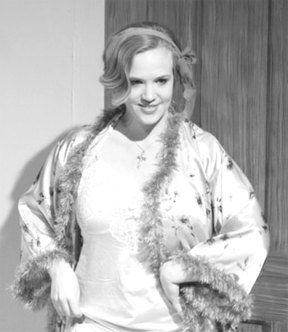It was an ambitious task to stage Kander and Ebb’s “Cabaret” at Whidbey Island Center for the Arts.
Not only did the production have to live up to audience expectations of the glittery spectacle of the 1972 movie and past theater productions of “Cabaret,” but the production team also had to recruit singers, actors, dancers and an orchestra from the South Whidbey community who could capture the authentic, raunchy atmosphere of a Berlin cabaret in 1929.
But director Ned Farley succeeded and the cast and crew blew away the audience during the opening weekend.
On the eve of the Nazi party’s rise to power, the performers of the Kit Kat Club have created a microcosm for themselves where everything and everybody is beautiful, and where life — fueled by sex and gin — is beautiful, too.
This fragile world is held together and sent spinning by the decadent and flamboyant Emcee, played by Jason Dittmer.
Dittmer not only carried the plot forward throughout the play, but was the heart and soul of this production.
Fully committed to the character, emotionally and physically, he sang and danced in sometimes nothing more than his underwear. Dittmer channeled the rawness and ugliness from under tons of make-up.
The show starts simply. One night, a young American writer, played by Jeff Fors, turns up amidst the cabaret crowd of lost souls in ripped stockings and corsets and is instantly drawn into this world.
If Dittmer’s Emcee is the personification of the decay of society in Germany of the time, writer Cliff Bradshaw is the moral compass of the show. Fors captured this trait of the character perfectly.
At its core, “Cabaret” follows the intertwined lives of two couples trying to create happiness as the Nazis rise to power. Kit Kat Club singer Sally Bowles (Kira Keeney) more or less highjacks the writer’s life and heart.
Meanwhile, a love affair blossoms between their spinster landlady, Fräulein Schneider (Kathryn Sandy O’Brien) and lonely Jewish shopkeeper Herr Schultz (Eric Hood).
The relationship between Fräulein Schneider and Herr Schultz is both touching and prophetically sad.
Blind to the ambitions of the Nazis, Schultz believes that politics come and go. He has seen it all, and he believes, even when bricks come flying through his shop’s window, that life will go on as usual.
Fräulein Schneider feels the rising pressure of the Nazis and is torn between ensuring her survival and not wanting to die alone.
While Hood portrayed the innocence and apathy of his character eloquently, O’Brien matched him in her torment. She also infused these emotions into her songs and never lost her German accent throughout.
Another standout among the actors was Kira Keeney as Sally Bowles. She captured the fluttery night club diva’s denial masked by undying optimism and irresponsible behavior.
But Keeney amazed the audience when she belted out the musical’s signature song, “Cabaret” fighting through (theater) tears as she sang the song as her declaration of independence at the end of the show.
Another one of Fräulein Schneider’s colorful tenants is prostitute Fraulein Kost, who provides comic relief as scores of sailors circulate through her room. Morgan Bondelid revealed a strong Fräulein Kost and made her mark when she launched into a fierce rendition – gradually joined by the cast – of “Tomorrow Belongs To Me,” the Nazi hymn of the play.
Brian Plebanek as Ernst Ludwig, Bradshaw’s pal and burgeoning Nazi, transitions skillfully from a playful, likable acquaintance to the coldness of his character’s politics. However, he tended to mug during “Tomorrow Belongs To Me” which made him look a bit cartoonish.
Undoubtedly, the success of the show is due to the Kit Kat Club. The Kit Kat dancers made up a delightful company of misfits trying to survive, and choreographer Kathryn Sandy O’Brien gave them provocative, fast moves to highlight them. While the stronger and weaker dancers blended nicely in this ensemble, it stood out that the dancer playing Helga often forgot to keep her stage face on. For a dancer, not just the body counts — it’s the facial expressions that often sell the moves.
Another one of the younger performers, Kit Kat Boy Bobby, tended to overact and turned his character into a caricature at times.
Without the orchestra set up high on stage, the show would have lost much of its energy. One of the most challenging tasks in a musical production is uniting a band with the other performers.
But the Kit Kat Club orchestra, led by Chris Harshman, mastered the task beautifully. However, at times the sound of the band overpowered the singers.
The stage crew, which turned the entire theater into the Kit Kat Club, also deserves high praise. From lighting to set design to props, a large crew pulled together a seedy cabaret and a minimalist array of “furnished rooms” at Fraulein Schneider’s boarding house.
Hats off to Farley for tackling such a racy and political show and resisting the temptation to tone down any of the show’s steamier elements. The WICA version of “Cabaret” captured the grittier, darker, but truer nature of the original “Berlin Stories.”
This production could easily be one of the best — and certainly one of the most memorable — productions in recent WICA history.



